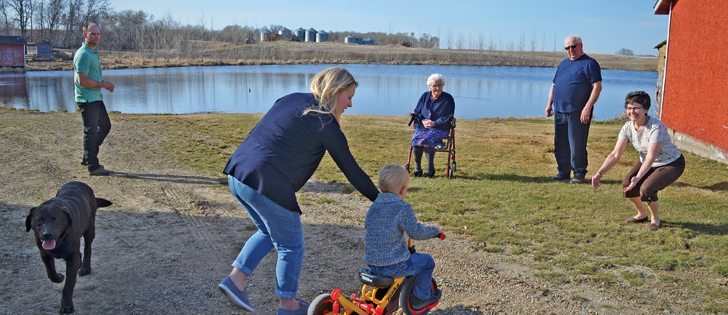Saskatchewan has declared 2016 the year of Ukrainian settlers, recognizing how they changed the province
WAKAW, Sask. — It’s not uncommon for four generations of Uhryns to gather in the family home.
Ukrainian baba Emily resides with her son, Ernie, and his wife, Arlene, in their home near Wakaw, Sask. Nearby, the couple’s son Jason and his wife, Oxanah, farm where the family homesteaded more than a century ago.
In 1906, at age 28, Ernie’s grandfather, Ivan, immigrated to Canada with his mother, Helena. They left behind Ukraine after enduring drought, famine, political unrest and labour strife under the Russian empire.
Read Also

Know what costs are involved in keeping crops in the bin
When you’re looking at full bins and rising calf prices, the human reflex is to hold on and hope for more. That’s not a plan. It’s a bet. Storage has a price tag.
“It was so overruled in Ukraine and they came in desperation … to make a better life for themselves and I think that’s what was in our grandparents’ minds, was that it can’t be any worse somewhere else,” Arlene said.
The provincial government has named 2016 as the year of Ukrainians, recognizing settlers from Ukraine who helped build the province.
That’s an important acknowledgement, said Jason.
“Not everybody knows about the immigrants that came that long ago … generation after generation stick to the same occupation … this is what they did and they’re still doing it: to be recognized, is an honour.”
The Dominion Lands Act offered homesteads to settlers willing to clear land and build residencies on the Prairies. This was a hefty challenge without the appropriate tools or provisions.
“Grandfather was hard working but that was a different style, different type of work, that was all muscle, hand work, horse and plow days so they worked on small parcels of land at that time,” Ernie said.
Ivan received title in 1911 and the following spring his wife, Paraska, and daughter, Mary, immigrated to Canada to join him.
Peter, the youngest of their seven children, stayed on the farm to help his parents, a common trait in Ukrainian culture.
He married Emily Michayluk from the St. Julien district and they farmed and raised their four children alongside his parents.
That tradition continues today with Jason and Oxanah raising their son, Evan, alongside Ernie and Arlene.
Jason left the farm to attend school and received a degree in agriculture, but years later he is at the helm of the farm.
“I was the only son, so I came back and I enjoyed it. Guido worked hard to build that land and Dad did, so why would it end with Dad and it just goes to waste,” said Jason.
The farm is a mixed grain operation, but for early generations mixed farming meant livestock and grain production. The Uhryn family farm is completely independent and the ways of farming have evolved.
“As you’re progressing, you acquire more land for grain production and that was one of the reasons why the mixed farming operation phased out,” said Ernie.
Technology also changed rapidly between Peter and Ernie’s generations. Today Jason keeps his records electronically, but remnants of Peter’s work can still be found on the old seeder.
“Guido (grandfather) used to put just in writing his pounds per acre or what he used to seed at or the calibration he used… whereas for myself I’m not writing it on the air tank.”
Unlike so many leaving their family farm, Jason intends to stay. Arlene, Jason’s mother, attributes his conviction to their heritage and traditions.
“Handing (the farm) down, say Mom and Dad and now both of us and now onto our children, I think that’s probably why the love of the land is still there, because you want to keep it as long as you can.”
In 1969, everything was lost to a fire on the farm except a log cabin built for grain storage that still rests on the property.
Peter was determined to rebuild, said Ernie.
“Things had to get done like there was no tomorrow, everything had to be done today. He was very hard working,” he said.
Arlene remembers Peter’s perseverance through the tragedy.
“He wasn’t going to let anything, any kind of catastrophe, or any downfall set him back at all. Not just to prove to himself, but to prove he could still make a life for his family even though the fire had hit and it burnt everything down to the ground.”
“Our roots are pretty deep here and we’re pretty proud of what we‘ve kept up,” said Arlene.
Canada has the world’s third-largest Ukrainian population behind Ukraine and Russia. There are 1.3 million Canadians of Ukrainian descent, with 52.5 percent residing in the Prairies.
Celebrations have been taking part across the province. The Vesna Spring Festival in Saskatoon took place this month and the upcoming Mosaic 2016 is planned for June 2-4 in Regina.
Contact tennessa.wild@producer.com















